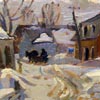artists
Alexander Young Jackson (1882-1974)
Born in Montreal, A.Y. Jackson created, taught and promoted an art
responsive to Canadian conditions. A member of the Group of Seven,
he was recognized during his lifetime for his contribution to the
development of art in this country. The focus of Jackson's art was
landscape painting.
Jackson took evening art classes with William Brymner at the Art
Association of Montreal in 1902, and at the Art Institute in Chicago
in 1906. He studied with Jean-Paul Laurens at the Académie Julien,
Paris in 1907. Back in Quebec, Jackson's painting The Edge of the
Maple Wood, 1910 was admired by Lawren Harris. Jackson was contacted
by J.E.H. MacDonald and met other members of the future Group of
Seven at the Arts and Letters Club, Toronto. In 1913 Dr. James
MacCallum sponsored his painting for a year. Jackson worked at
MacCallum's Studio Building, Toronto until 1955 (Terre Sauvage,
1913. He was good friends from 1921 with the artist Anne Savage.
Jackson traveled Canada throughout his career, sketching outdoors.
He visited Europe in 1905, 1906-1912, and 1936. His career was
supported informally by many patrons.
Jackson worked at a Montreal lithography company. In 1906 he worked
at a Chicago design company. In 1914 he shared a studio with Tom
Thomson and painted in Algonquin Park (The Red Maple, 1914,). During
WWI Jackson joined the infantry, serving as a war artist in
1917-1919. He joined the Group of Seven, exhibiting with them in the
1920s. He taught at the Ontario College of Art in 1924, resigning in
1925 to continue the outdoor sketching essential to his art. From
1943 to 1949 he taught at the Banff School of Fine Arts. Jackson was
art columnist for the Toronto News in 1943-49. Incapacitated by a
1968 stroke, Jackson lived as artist-in-residence at the McMichael
Collection, Kleinburg, Ontario from 1969.
| Street in Baie St-Paul, Qué. | ||
|---|---|---|
|
|
|
